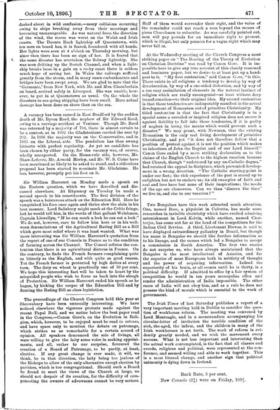At the Wednesday meeting of the Church Congress a most
striking paper on " The Bearing of the Theory of Evolution on Christian Doctrine" was read by Canon Gore. It is im- possible here to give any true account of this closely reasoned and luminous paper, but we desire to at least put up a hand- post to it. "My first contention," said Canon Gore, "is this. There exists in all religions a tendency to develop by way of deterioration, by way of a one-sided distortion, and by way of a too easy assimilation of elements in the natural instinct of religion which are really uncongenial—at least without deep transformation—to their original idea. My second contention is that these tendencies are indisputably manifest in the actual development of Romanism out of primitive Christianity. My third contention is that the fact that Christianity is in a special sense a revealed or inspired religion does not secure it against liability to fall into these tendencies, if it is guilty of neglect in using the means which would prevent such a disaster." We may grant, with Newman, that the existing Romanism is the only real living development of primitive Christianity, and yet " it does not therefore follow that a position of protest against it is not the position which makes us inheritors of John the Baptist and of our Lord himself." Canon Gore ended by a most striking declaration as to the claims of the English Church to the highest vocation because that Church, though " unfettered by any un-Catholic dogma." had retained the appeal to Scripture, which prevented develop- ment in a wrong direction. " The Catholic starting-point is under our feet; the rich experience of the past is stored up to enlighten but not to enslave us; its old examples of faith and zeal and love have lost none of their inspirations; the needs of the age are clamorous. Can we then discern the time' we live in, and rise to our vocation P "


















































 Previous page
Previous page